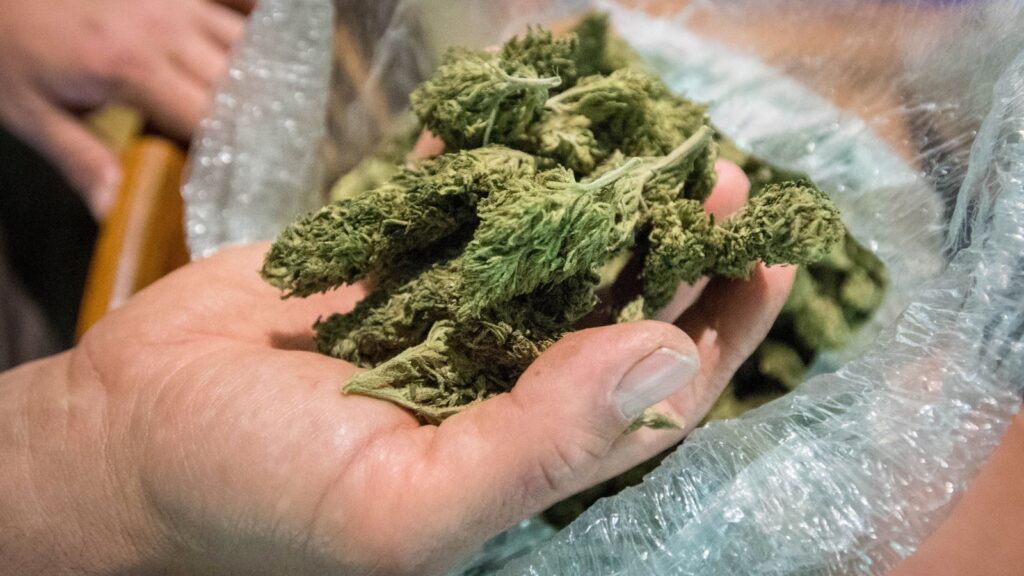As sales for the state’s recreational cannabis industry take off, New Jersey’s decade-old medical marijuana program is shrinking every month.
Medical marijuana sales are nearly half of what they were six months ago, and more than 20,000 patients dropped out of the medical program since its peak in May 2022, according to state data.
Experts say that’s expected for a state now offering recreational cannabis, but they want the Legislature and state agencies to continue emphasizing the importance of the medical marijuana program.
“It’s not an uncommon occurrence for medical programs to dip down when there are other more economical sources,” said Ken Wolski, director of the Coalition for Medical Marijuana New Jersey. “More medical patients are finding different access, or just rejecting the idea of seeing a doctor in addition to paying for the product.”
Jeff Brown is the executive director of the Cannabis Regulatory Commission, the agency overseeing the state’s recreational and medical marijuana programs. He also attributed the drop in patients to the recreational cannabis market, which doesn’t require a buyer to jump through hoops to visit a doctor.
New Jersey became the 14th state to legalize medical marijuana when then-Gov. Jon Corzine (D) signed it into law in January 2010. The state’s first medical dispensary opened in 2012, and now, more than 40 dispensaries sell to medical cardholders.
A medical marijuana card costs up to $100 for two years of certification. People can qualify under dozens of medical conditions, ranging from muscular dystrophy and multiple sclerosis to anxiety and migraines. Before 2019, a medical card cost $200 and only patients with certain severe medical conditions could get it.
There are also exclusive benefits medical marijuana patients can get—discounts, waived taxes, higher purchase limits and the ability to buy medical weed in other states.
Brown said the CRC regularly conducts outreach to “make sure those advantages are publicly known.”
In the year before adult-use sales launched, the medical program skyrocketed to over 129,000 patients. But by June, that had tumbled to 105,000 patients. And medical sales during the third quarter of 2022 totaled $61 million, which fell to $34 million by the first quarter of 2023.
That’s a “staggering decline” of 45 percent, said Todd Johnson, executive director of the New Jersey Cannabis Trade Association.
He told the Senate Judiciary Committee during a hearing on cannabis in June that medical-only dispensaries are “desperate” to expand their operations because of the slashed sales.
New Jersey has been slow to ramp up the recreational market too, he said. The Garden State sold just $179 million in the last three months. Meanwhile, Missouri—a state two thirds the size of New Jersey—sold $256 million its first three months, Johnson said.
“New Jersey must act to strengthen the cannabis marketplace and make it easier to operate, or risk seeing operators fail under the weight of bureaucracy and unnecessarily high operating costs,” he said during the hearing.
Wolski commended the CRC for prioritizing medical patients as the recreational market takes hold. Patient-only shopping hours and parking spots, along with priority to cannabis access, have been crucial to medical marijuana shoppers, he said.
But there’s still plenty of room for growth—like home grow, he said. Two bills introduced in the Legislature would create a home cultivation program, one solely for medical patients and another for anyone who wants to grow their own weed, capped at six plants. Neither measure has moved out of committee.
New Jersey is the only state with a medical program that doesn’t allow patients to grow their own marijuana. Growing one cannabis plant in New Jersey is a crime that can carry up to five years in prison and a $25,000 fine.
“It would be a lot cheaper for patients to grow a small number of plants to meet their needs, and would also guarantee specific availability of strains that are specific to that patient’s condition or combination of conditions,” Wolski said.
Plus, there’s the therapeutic bonus of just gardening. “Twice the bang for your buck,” he added.
Wolski also wants to see insurance companies cover medicinal cannabis and hopes hospitals become more willing to provide medical marijuana. Many people in psychiatric hospitals and prisons qualify and would benefit from medical marijuana, he said.
New Jersey has some of the most expensive weed in the nation, so people could still be turning to the legacy market for bulk deals and better prices, he added. But street marijuana isn’t subject to the same rigorous testing standards that the state’s dispensaries must abide by, he said.
“I think with a little patience, we’re going to start seeing this recreational market is a model for the rest of the country,” he said. “I certainly have to give them a great deal of credit.”
Source : Marijuana Moment


